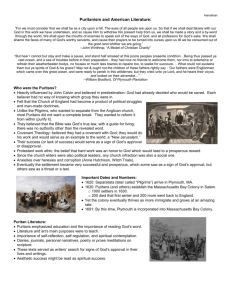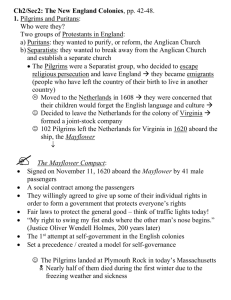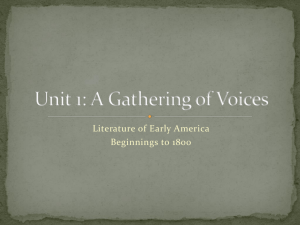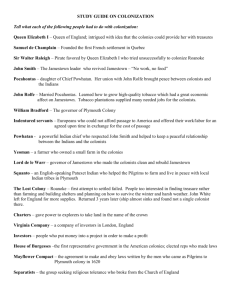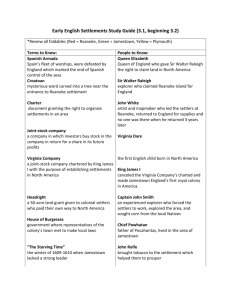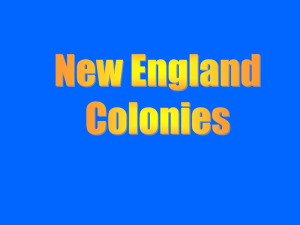Reasons for English Colonization
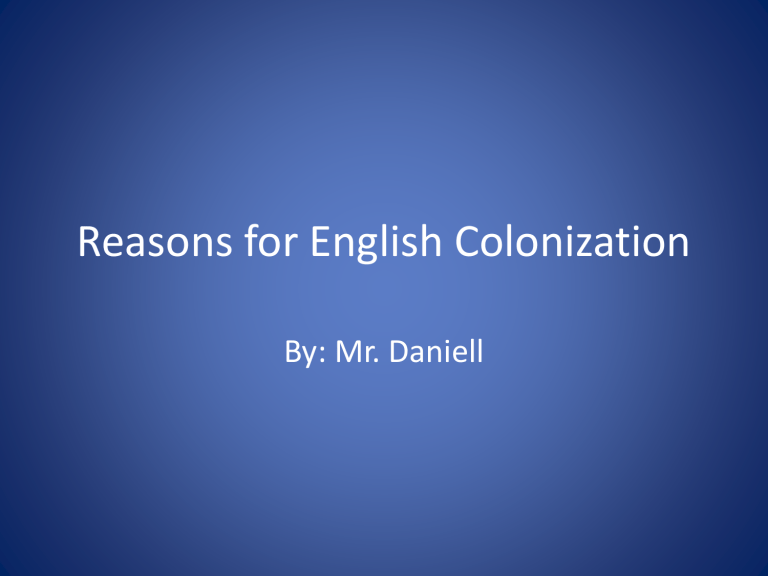
Reasons for English Colonization
By: Mr. Daniell
Economic Reasons
• Mercantilism
More Economic Reasons
• High unemployment in England caused by landowners who forced tenant farmers off the land
• Promise of gold to increase England’s wealth
• Indentured servants – young, unskilled workers who exchanged their labor for a period of time, usually three to seven years, for passage, room, and board in America for a better life
Jamestown
(Example of Economic Reason for Colonization)
• 1607 - Jamestown founded in Virginia; first permanent
English settlement in North America.
http://www.history.com/topics/ja mestown/videos#life-injamestown
Jamestown
• Reason for settlement:
– King James I granted a charter to a group of
London entrepreneurs, the Virginia
Company, to settle Virginia, find gold, and seek a water route to the east
Jamestown
• Early hardships:
– Hot climate was not conducive to the growth of the plants they had brought from England
(farming)
– Swampy location of settlement caused health issues – polluted water, mosquitoes spreading disease (disease caused 80% of colonists to die)
– Attacks by the native Algonquian Indians made life almost impossible
Jamestown
• John Smith – leader of
Jamestown established rigid discipline, strengthened defenses, and encouraged farming with this admonishment: "He who does not work, will not eat."; because of his strong leadership, the settlement survived and grew
Captain John Smith
Jamestown
• Pocahontas - daughter of Powhatan, the powerful chief of the
Algonquian Indians in the Tidewater region of
Virginia near
Jamestown who helped the colonists received food from the Indian; vital link between colonists and Native
Americans http://www.history.com/topics/jamestown/videos#pocahontas
Jamestown
• John Rolfe – developed cash crop of tobacco at
Jamestown that saved the colony (the ability to grow tobacco made land especially valuable, causing a significant population growth); married Pocahontas
Jamestown
• House of Burgesses was the first representative assembly in the
American colonies.
• (Burgesses means elected officials.)
Jamestown
• Bacon’s Rebellion (The
Background)
– Bacon led a group of frontier settlers in a rebellion against the
Governor of Jamestown.
They were mad about high taxes and no protection from the Native Americans.
– They took control of the
House of Burgesses and burned Jamestown to the ground.
Jamestown
• Bacon’s Rebellion (The Result)
– Bacon died from illness, his followers were hanged.
– BUT, the House of Burgesses passed laws so that a royal governor could not have that much power again.
– Showed that colonists WILL fight for rights.
Political Reasons for Colonization
• Search for the
Northwest Passage to India in order to compete with Spain and Portugal
• Acquisition of territory to add to empire
• Buffer against
Spanish colonies in
America
Social Reasons for Colonization
• Freedom from religious persecution
• Protection of culture
Plymouth
• Plymouth Colony
(example of social reason- religious freedom)
• 1620 – arrival of the
Pilgrims in Plymouth and the signing of the
Mayflower Compact http://www.history.com/topics/thirteen-colonies/videos#the-mayflower
Puritans & Pilgrims
•
Separatists—Protestant
group that cut all ties with the Church of England & developed their own churches
• Pilgrims: a group of
Separatists
Puritans & Pilgrims
• 1608: Pilgrims escape to Netherlands to freely practice religion
Puritans & Pilgrims
• Immigrants—people who leave their original country to live in another country
• Pilgrims unhappy in Netherlands
• Formed a joint-stock company & returned to England
Plymouth
• •Reason for settlement: Pilgrims fled religious persecution in England; after a decade in Holland, came to America in order to worship freely
Plymouth
• Mayflower
Compact – Signed by the men on the
Mayflower, an agreement that established selfgovernment and gave the leaders the power to enact laws for the good of the colony.
The Founding of Plymouth
• Mayflower
Compact written because colonists landed too far away from Virginia to be ruled by its government.
Original Mayflower
Compact
The Founding of Plymouth
Signing the Mayflower
Compact
• Mayflower
Compact— documents creating a new political society signed by the
Pilgrims
The Founding of Plymouth
• Pilgrims land in present-day
Massachusetts in late 1620
The Pilgrim Community
• Women had more rights in the Plymouth Colony than they had in England:
– Make Contracts
– Own property
– Bring cases before court
Plymouth
• Early hardships: During the first winter in the
New World, the colonists suffered greatly from disease, lack of shelter and general conditions onboard ship; 45 of the 102 emigrants died the first winter
Plymouth
• William Bradford -
Leader of Pilgrims
Pilgrims & American Indians
• March 1621: Indian walks into Pilgrim community speaking
English
• Pilgrims meet
Squanto
• Indians use Pilgrims in internal tribal struggle for power
Samoset walking into
Pilgrim community
Plymouth
• Squanto – created peace between the
Native Americans and Pilgrims and taught the Pilgrims how to hunt and farm
Massachusetts Bay Colony
• The Puritans come to
America fleeing religious persecution.
• Puritans create a community bound by common interest and law.
• They wanted to
“purify” the Church of
England
Puritans land at Plymouth Rock http://app.discoveryeducation.com/player/view/assetGuid/D36FFC29-BC97-45F2-AFA7-
74ACBE2ED5C8
Puritans
• Governor of
Massachusetts Bay colony was John
Winthrop.
• Established economy as a “common wealth”, meaning people work together for the good of the whole community.
Puritans
• Held “town meetings” (a form of self government in which they made laws)
• “New England Way” was a term used to describe the beliefs of their society.
Puritans
• Some Puritans moved to
Connecticut and set up a form of representative government called the Fundamental
Orders of
Connecticut.
Puritans
• Fundamental Orders of Connecticut was the first written constitution in the colonies.
• It gave voting rights to non church members and limited the power of the governor.
Puritans
• Puritans were centered around church.
• Salem Witch Trials
Colonial Self-Government
• In the absence of royal authority the colonies became accustomed to self-governance.
• The Virginia House of Burgesses was the first elected representative legislature among the colonies.
• The Fundamental Orders of Connecticut was the first written constitution for a colony.
Independent Government
French and Indian War
• Rivalry between
Britain and France over the Ohio River
Valley led to a worldwide conflict. The
War ended with the
Treaty of Paris in
1763. France loses all of its North American territory.
British advance on Indians in war.
Review Questions
• What motivated the explorers?
• Why were the colonies settled?
• How did the colonies develop self government?
• What motivated the war between Britain and
France?
